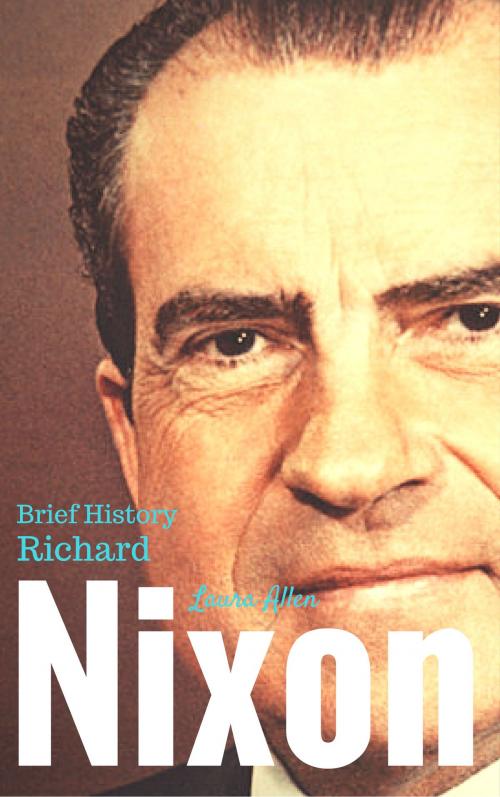| Author: | Laura Allen | ISBN: | 1230001214475 |
| Publisher: | Alan MOUHLI | Publication: | July 4, 2016 |
| Imprint: | Language: | English |
| Author: | Laura Allen |
| ISBN: | 1230001214475 |
| Publisher: | Alan MOUHLI |
| Publication: | July 4, 2016 |
| Imprint: | |
| Language: | English |
Richard Milhous Nixon, born January 9, 1913 in Yorba Linda, and died April 22, 1994 in New York, is a US statesman, 37th President of the United States, posted January 20, 1969 to August 9, 1974.
Was born in California in a modest family, Nixon studied at Duke University and became a lawyer. He served in the Navy during World War II before being elected representative congressional 12th District of California in 1946 and senator in 1950. His involvement in the Alger Hiss spy case established his anti-communist reputation and became known nationally. He was elected vice president in 1952 on the Republican ticket led by Dwight D. Eisenhower and held this post for eight years. He sought the presidency in 1960 but was defeated by Democrat John F. Kennedy and he also failed to become governor of California in 1962. His journey through the desert ended six years later by his election to the White House. Although he began by increasing US involvement in Vietnam, he put an end to the intervention in 1973 and negotiated end to the conflict. His visit to China in 1972 allowed the opening of diplomatic relations between the two countries and he initiated détente and the ABM treaty with the Soviet Union the same year. In domestic policy, his administration supported devolution policy of the federal power to the states. It also strengthened the fight against cancer and drugs, imposed controls on prices and wages, had applied the desegregation of Southern schools and established the Environmental Protection Agency. Although he was president during the Apollo 11 mission, he reduced support for the US space program. He was reelected in 1972 with an overwhelming majority. His second term was marked by the first oil crisis and its economic consequences, the resignation of Vice President Spiro Agnew and successive revelations about his involvement in the Watergate scandal. The affair cost Nixon the most of his political support and led him to resign Aug. 9, 1974 to avoid a probable impeachment. After leaving office, he enjoyed a pardon from his successor, Gerald Ford.
During his retirement, Nixon wrote many books and made many trips abroad to rehabilitate his public image. Suffered a serious stroke on 18 April 1994, he died four days later at the age of 81. The legacy and the Nixon personality continue to be subject of considerable debate.
Richard Milhous Nixon, born January 9, 1913 in Yorba Linda, and died April 22, 1994 in New York, is a US statesman, 37th President of the United States, posted January 20, 1969 to August 9, 1974.
Was born in California in a modest family, Nixon studied at Duke University and became a lawyer. He served in the Navy during World War II before being elected representative congressional 12th District of California in 1946 and senator in 1950. His involvement in the Alger Hiss spy case established his anti-communist reputation and became known nationally. He was elected vice president in 1952 on the Republican ticket led by Dwight D. Eisenhower and held this post for eight years. He sought the presidency in 1960 but was defeated by Democrat John F. Kennedy and he also failed to become governor of California in 1962. His journey through the desert ended six years later by his election to the White House. Although he began by increasing US involvement in Vietnam, he put an end to the intervention in 1973 and negotiated end to the conflict. His visit to China in 1972 allowed the opening of diplomatic relations between the two countries and he initiated détente and the ABM treaty with the Soviet Union the same year. In domestic policy, his administration supported devolution policy of the federal power to the states. It also strengthened the fight against cancer and drugs, imposed controls on prices and wages, had applied the desegregation of Southern schools and established the Environmental Protection Agency. Although he was president during the Apollo 11 mission, he reduced support for the US space program. He was reelected in 1972 with an overwhelming majority. His second term was marked by the first oil crisis and its economic consequences, the resignation of Vice President Spiro Agnew and successive revelations about his involvement in the Watergate scandal. The affair cost Nixon the most of his political support and led him to resign Aug. 9, 1974 to avoid a probable impeachment. After leaving office, he enjoyed a pardon from his successor, Gerald Ford.
During his retirement, Nixon wrote many books and made many trips abroad to rehabilitate his public image. Suffered a serious stroke on 18 April 1994, he died four days later at the age of 81. The legacy and the Nixon personality continue to be subject of considerable debate.















